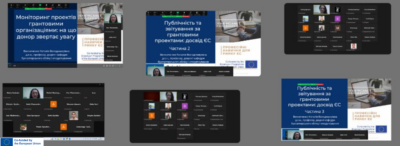During October 2024, within the framework of the project “EU Experiences for Enhancing Youth Employability through Professional Skills Development” , implemented within the framework of the Jean Monnet Module, with the support of Erasmus+ (ERASMUS – JMO -2021-MODULE -SKILLS4JOB-101047867), Doctor of Economics, Associate Professor of the Department of Accounting and Taxation Vynnychenko N.V. implemented a series of workshops during the ‘’Laboratory of Ideas‘’ for PhD students of Sumy State University.
The purpose of these events was to develop theoretical knowledge and practical skills in reporting on EU-funded grant projects.
The following topics were covered during the ‘’Laboratory of Ideas‘’:
- project monitoring by granting organisations: what the donor pays attention to;
- project communication strategy or why the project should be public;
- publicity of grant project reporting: EU experience Part 1 (dedicated to the types of reporting);
- publicity of grant project reporting: EU experience Part 2 (dedicated to the project budget and its implementation);
- competences of employees who keep records and report on projects.
A series of events within the laboratory of ideas develops skills in project implementation, documentation of all project operations, project disclosure and reporting on EU-funded projects.
The ERASMUS+ project “EU Experiences for Enhancing Youth Employability through Professional Skills Development” continues to actively promote the preparation of undergraduate and postgraduate students for international employment and provides them with opportunities to improve their skills and enrich their knowledge in line with the requirements of the modern labour market.
The project “EU Experiences for Enhancing Youth Employability through Professional Skills Development” is funded by the European Union. However, the views and opinions expressed are those of the authors alone and do not necessarily reflect the views of the European Union or the European Education and Culture Executive Agency (EACEA). Neither the European Union nor EACEA can be held responsible for them.
